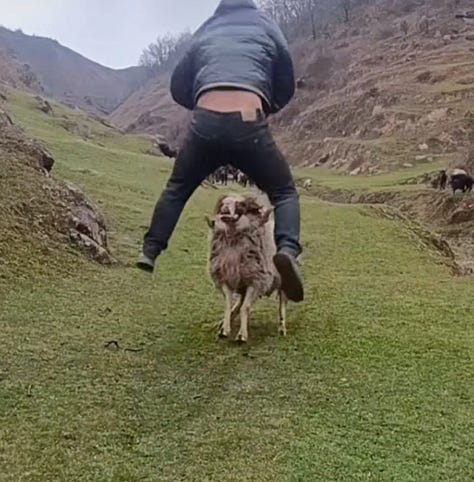Jumping Over Sheep
No explanation
Good Morning:






And that’s all the explanation you’re going to get.
The Cause Of The Day
In light of the recent earthquake in Myanmar, today’s organization is Advance Myanmar, a UK-based group providing resources and support to civil society organizations within Myanmar.
The aid situation in Myanmar is extremely complicated right now, because the military government only has effective control of 20 to 30 percent of the country’s territory. In addition, the junta seems to be blocking aid from reaching critical areas. Advance Myanmar works with civil society organizations in both rebel-controlled and military-controlled areas, so they are attempting to identify and support areas where aid is being cut off. AM partners with local organizations of various ethnic affiliations, including Rohingya, Karenni, Kachin, and Ta’ang groups, and with cross-ethnic civil society organizations, including a support network for former political prisoners and a local LGBT network. AM is a small organization, and provides a patchwork of as-needed assistance to their local partners. Last year, they provided everything from technical support to a human rights organization setting up a website to document government abuses in Karenni State to emergency food aid to a remote village destroyed by bombing so that residents would not have to abandon their homes. You can read their 2024 report here for more information on their work. Please note that Advance Myanmar is a UK charity, so donations will not be tax-deductible in the US.
Yesterday on #DogShirtTV, the estimable Holly Berkley Fletcher and I welcomed the extremely estimable Virginia Heffernan to tell us about her new podcast, a philosophical approach to The Situation. The estimable Jonathan Rauch also came by, and he and Virginia talked Nietzsche and Trotsky and Richard Rorty and everything in between. The estimable dog on my shirt was briefly accused of being a goat. She didn’t take offense.
Today On Lawfare
Compiled by the estimable Caroline Cornett
Ed Martin Has Some Explaining to Do
James Pearce shares a non-comprehensive list of questions that Ed Martin—the interim United States attorney for the District of the District of Columbia and nominee for the post—should have to answer about his plans for the office. Pearce highlights Martin’s comments about prosecuting unethical, as opposed to illegal, conduct; his suggestion to “rewrite” the Lewis list; and his praise for President Donald Trump’s pardons of two officers convicted of murder:
But it has only been two months, and Martin has not yet been confirmed. Jackson observed to the conference of U.S. attorneys that their “immense power to strike at citizens” meant that to obtain the position they were “required to win an expression of confidence in [their] character by both the legislative and executive branches” before they could “assum[e] the responsibilities of a federal prosecutor.” When the Senate Judiciary Committee convenes to consider Martin, it should press him to answer several questions about his conduct in the couple of months he has acted as the top federal prosecutor in D.C. and about his view of the prosecutor’s role. Like other candidates for U.S. attorney positions, Martin may not face a hearing, leaving “questions for the record” as the only way for the Senate to measure its confidence in Martin’s character and aptitude for the job.
The Justice Department’s Multifront Battle Against Drug Cartels
Michael Galdo describes the investigative tools and agency resources available to the Department of Justice following the administration’s designation of cartels as foreign terrorist organizations (FTOs) and other policy changes. Galdo outlines how the department may deploy these tools against cartels, including prosecuting individuals for “Material Support” of cartels and targeting cartels’ many sources of profit:
The Trump administration is taking an aggressive approach with the stated goal of utterly destroying the drug cartels. The new investigative and prosecutorial tools unlocked by the FTO designation will be useful. Existing multi-agency task forces, including OCDETF and JTTFs, will likely use a comprehensive approach, using criminal, national security, forfeiture, and administrative tools intending to pull the cartels out by their roots.
In the process of U.S. efforts to choke off the cartels’ financial operations, legitimate businesses may be forced to increase their due diligence and lower their risk tolerance in the areas where the cartels operate. This may cause additional economic pain both in Mexico and for legitimate businesses around the world, but if the administration’s goal is truly “total elimination” of these hydra-like criminal organizations then collateral consequences should be anticipated.
Podcasts
On Lawfare Daily, Adam Thierer joins Kevin Frazier to review public comments submitted to the Office of Science and Technology regarding the Trump administration’s Artificial Intelligence (AI) Action Plan. Frazier and Thierer also discuss recent developments in the AI regulatory landscape, including a major veto by Governor Youngkin in Virginia:
Today’s #BeastOfTheDay is the lion, seen here in triplicate, playing lazily:
In honor of today’s Beast, remember to have fun, even if you’re tired.
Keep reading with a 7-day free trial
Subscribe to Dog Shirt Daily to keep reading this post and get 7 days of free access to the full post archives.




